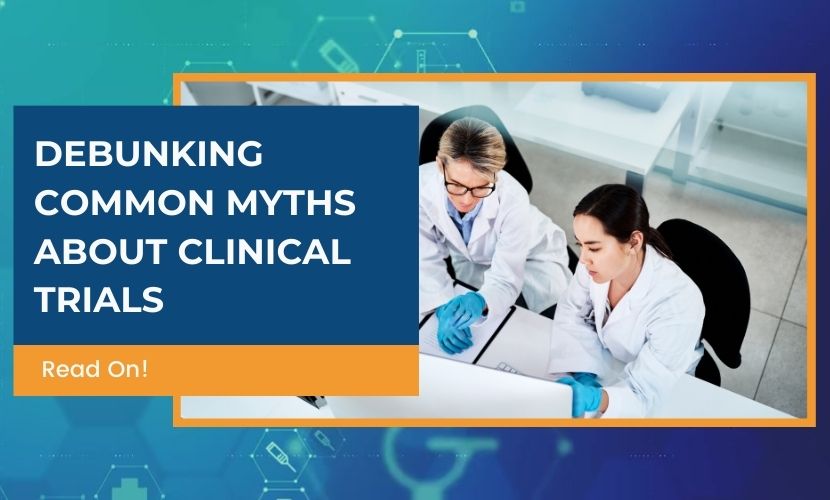Debunking Common Myths About Clinical Trials

Would you like to volunteer for the latest clinical trial? Nine times out of ten, the answer to this question is no. Why?
Unfortunately, most people don’t have proper knowledge of clinical research or clinical trials, are afraid of the medical industry, or have a combination of both.
The truth about clinical trials is that they are an essential step in the process of receiving new drugs on the market. Without clinical trials, clinical research teams would have no evidence the drug works or what, if any, side effects are associated with the drug.
By debunking clinical trial misconceptions, potential volunteers can gather more information on the clinical trial process and become more at ease in considering clinical trial studies for themselves.
“Volunteers and participants are guinea pigs: Clinical trials are the third step in the clinical research process. Extensive research, laboratory testing, and other testing occurs before human subjects can participate. “
Clinical Trial Facts
The clinical trial process consists of clinical research, animal testing, clinical trials with human subjects, a data review, and submission for FDA approval. There are clinical trial benefits and clinical trial risks. Understanding clinical trials means learning the process and how it can apply to you.
The purpose of clinical trials is to answer a question. Before the trial begins, clinical researchers build goals and objectives for the study. Data collected at the end of the clinical trial add to a better understanding of how the new drug works in the real world.
There are four phases of clinical trials. Phase 1 tests safety and dosage, followed by Phase 2, which tests efficacy and side effects. Phase 3 is the clinical trial before drug approval, which tests efficacy and adverse reactions. Approved drugs can continue clinical trial testing, referred to as Phase 4 trials. They test the drug’s safety and efficacy further with more real-world data.
Informed consent is the bridge between participants and the clinical research team. Another name for informed consent is human subject protection, a federal regulation requiring that participants be informed of previous drug data and research, potential risks and side effects, participant rights, and all other relevant information. After the conversation, participants must sign a legal authorization form confirming they’ve been made aware by the clinical research team.
Participant rights state that volunteers can end their involvement in the clinical trial at any point in time; they also have access to previous and current data results and any signs of side effects, its potential impact on the participant, and warnings of adverse events or negative effects that aren’t connected to the drug or underlying conditions.
Clinical Research Myths
Let’s disprove some clinical trial misconceptions, clinical trial participation myths, and clinical trial safety myths.
Clinical Trial Misconceptions
- Volunteers and participants need a doctor’s referral: Doctors are an excellent source for suggesting clinical trials to patients. However, healthy volunteers and patients can search and locate clinical trials independently.
- Clinical trials are a last-resort effort: Potential clinical trial volunteers and patients can seek a clinical trial anytime. It’s not a requirement for patients to attempt all other medical measures. Healthy volunteers are typically needed in Phase 1 clinical trials. Potential participants with the clinical trial parameters are required for all phases of clinical trials.
- Clinical trials aren’t effective: It’s true clinical trials aren’t a cure. Clinical trials aim to test the efficacy, safety, and side effects of new drugs and vaccines. Any data accumulated from any clinical trial phase is crucial to understanding how the new drugs work. Therefore, all and any participation is appreciated and effective.
Clinical Trial Participation Myths
Volunteers and participants are guinea pigs: Clinical trials are the third step in the clinical research process. Extensive research, laboratory testing, and other testing occurs before human subjects can participate.
- Volunteers and participants can’t say no or change their minds: Any volunteer or participant in a clinical trial has complete autonomy over their body and their choices. A crucial part of patient safety is their ability to reject the clinical trial or opt out at any point.
- Anyone can volunteer or participate in a clinical trial: Yes and no. All are welcome to seek out clinical trials. However, there is an open enrollment period. After the set date, the clinical trial is closed. Most trials also set a list of criteria for patients. The selected criteria are critical to the research, the clinical research data, and the results they are working to achieve.
- Volunteers and participants will only receive a placebo or be a part of the control population: A placebo population is important to the statistical data. Typically, Phase 1 clinical trials are where control groups are utilized.
Clinical Trial Safety Myths
- Volunteers and participants don’t have privacy rights and/or have to release their health data to the clinical research team and sponsors: Informed consent and human subject protection are crucial elements of the clinical trials process. Both ideas support informing potential participants of all relevant information about the drug being tested and their rights throughout the clinical trial process, such as the right to data and results and the right to end participation in a clinical trial.
- Volunteers and participants aren’t given a standard or above the standard level of care during the clinical trial: Special boards like institutional review boards (IRBs) and independent ethics committees (IECS) are enacted to ensure clinical research teams follow patient safety measures and participants receive the best levels of care.
- Clinical trials are dangerous: Clinical trials are testing and researching a new drug or vaccine so the results can foster side effects and even adverse events. However, previous research and testing on the drug before human interaction help minimize both. The IRBs and IECs also review the data before and during the clinical trials to ensure patient safety.
Finding Clinical Trial Information
Every clinical trial is different because it wants to answer different questions with the data. This means that participant criteria, the trial’s length, and the trial’s phase differ each time. What doesn’t change is what’s expected from volunteers, how volunteers are treated, and volunteers’ rights and privacy.
Clinical trial enrollment can suffer because of common misconceptions about clinical trials. Now that some of the most common myths have been debunked, you can find the clinical trial information that’s right for you.
Interested in joining a study or want to learn more? View a list of our currently enrolling studies.


